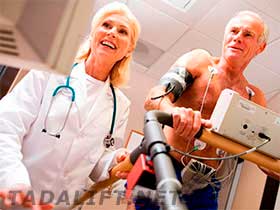Aging is a devastating process that presupposes a range of health complications and aggravations. While the vast majority of males are not proactive, considering personal health care, required with age, some of them still take maximal care of the condition.  The results of recent study have shown that over 70% of males would not contact a medical specialist even if they have experienced a serious health aggravation, including breathing complications, chest pain and others.
The results of recent study have shown that over 70% of males would not contact a medical specialist even if they have experienced a serious health aggravation, including breathing complications, chest pain and others.
However, irrespective of the negative tendency, regular medical consultations are required for all the males, especially aging ones. Qualified doctors and medical specialists specify several types of medical tests that should be passed and examinations undergone by males, including:
- Testicular exam. While testicles play an ultimately effective role in the overall male functioning, especially the reproductive system, men of all ages should regularly check their functioning. Self-examination is acceptable, but visiting a medical specialist at least once a year is still necessary. The risk of testicular cancer is low after 40, while the danger of prostate cancer development is ultimately high in males over 50;
- Heart tests. Blood pressure, triglyceride level, cholesterol ranges and other heart-related tests should be regularly taken in order to preserve the health condition balanced and eliminate possible complications;
- Colonoscopy.
 Patients, who have a family history of colon cancer should start testing earlier, while other patients should pass these tests on a regular basis starting from the age of 50;
Patients, who have a family history of colon cancer should start testing earlier, while other patients should pass these tests on a regular basis starting from the age of 50; - PSA test or rectal exam. Screening the prostate, the prostate specific antigen test, a rectal exam and other medical procedures should be passed in order to define possible prostate cancer at early stages. The risk of prostate cancer development increases as a man ages and reaches its peak at age 50-60;
- Skin exam is necessary for aging males, too, as it is a dependable way to prevent skin cancer.

